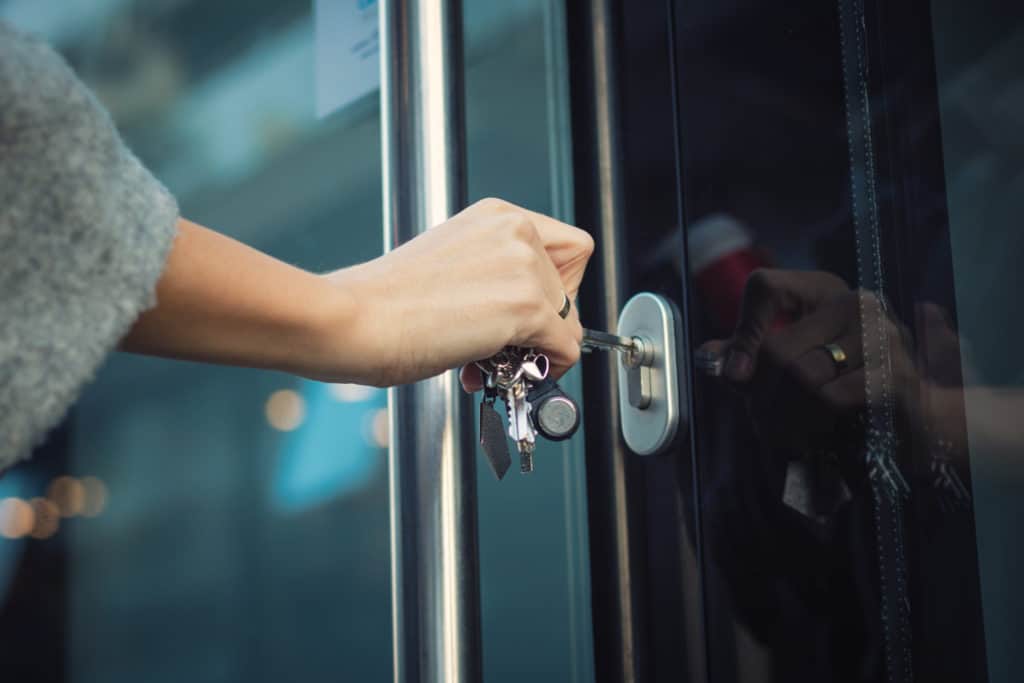
A topic that comes up frequently at Apartment School is the question about Inspections. How often can a landlord do inspections? What can they look at when they are in my apartment? Can they just come over unannounced? What rights do I have as a tenant and what rights does my landlord have to inspect my apartment?
This is quite an issue considering there are several sides to ownership, privacy, tenant rights, landlord rights, and just basic decency.
While there have been rare cases where a landlord has gone overboard with inspections of their apartments, the overwhelming majority of times, they are only going to request an inspection for one of two reasons:
- It is part of the yearly or periodic inspection laid out in the lease
- They have reason to suspect something is wrong
Outside of these two reasons, there is no basis for a landlord to just come over to your place and walk through your apartment to give you a hard time. But landlords are only looking for problems that will impact their investment in the apartment complex. Landlords are looking to make a profit, not to give you a hard time just because.
Now, if you have been treating your apartment poorly, the neighbors have reported a foul smell coming out of your unit, or the apartment below you is mentioning a water leak coming from above them, then they absolutely have the right to come over and inspect your apartment. Many times though, it isn’t even because you have done or not done something, it is just for the safety and integrity of the apartment building as a whole.
If you are a good tenant and have been taking care of your apartment, then you have absolutely nothing to fear over getting a notice from your landlord that they are coming to do an inspection.
Why Would A Landlord Do An Inspection?
There are many reasons why a landlord will do an inspection, but no matter what the reason, it all comes down to one thing: Preventing Expensive Damage.
Normal yearly inspections give the landlord the opportunity to identify any problems with the apartment, whether you caused them or not. It is not necessarily to try and do a “Gotcha!” as a way to just keep your security deposit. The dream of all landlords is to have long-term renters that are good to their apartment and property. They want to keep you as a part of their complex.
If you are keeping up your end of the bargain and complying with everything that is on the lease agreement, you are not going to have any problems with them doing an inspection. There are virtually no landlords out there who would rather try and swindle you away from a measly security deposit and lose you as a renter. It costs a considerable amount of time and money to get an apartment ready for the next renter to come in. (Link To Article detailing costs for landlords)
Periodic inspections also let the tenant know that the landlord cares about their property. It puts little impetus on the tenant to take care of the apartment if the landlord and manager send the signals that they themselves don’t even care about it enough to check on it.
Unless your landlord is doing excessive inspections, try to view a periodic visit by them as their way of maintaining the integrity of their property, not because they are out to get you in some nefarious way. 10 out of 10 landlords will tell you that they have much better things to be doing than going around snooping on their tenants unless they have been given good reason to do so.
When Can The Landlord Do An Inspection Of My Apartment?
The terms and conditions for doing an inspection should be laid out in the lease agreement you signed when you started renting. Usually, a typical lease is going to stipulate that there will be one or two inspections per year. This is very normal, and while any inspection can feel invasive, realize that the landlord is only doing it to maintain their investment.
If however, they have reason to come over for a reason that is unrelated to normal, periodic inspections, then they fully have the right to do that because it is their property. We will go over the conditions that must take place further down in the article. If your landlord isn’t fulfilling these requirements and valuing your privacy and property, then you will have a legitimate gripe on your hands.
Often times, a landlord will do the inspections when they come around to provide batteries for the smoke detectors or maybe to replace the furnace filters. This way, they can kill two birds with one stone, make sure your furnace is running up to snuff and make sure you have power in your smoke detectors.
What Can A Landlord Look At During An Inspection?
The vast majority of inspections are simply looking for long-term, potentially expensive damage to the apartment. The landlord needs to ensure that he is taking good care of his investment, and periodic inspections are the way to do that. Just as you would check anything out you value from time to time, the landlord is going to do this as well with his apartments.
However, there are other reasons why you might be receiving a letter or verbal notice from your landlord concerning an inspection.
Neighbors are going to report things they notice to their landlord or manager about the other tenants in the apartment. That’s just the nature of having neighbors living close to you. Sometimes it may come down to a petty thing where someone just doesn’t like a person for whatever reason, but most times, they are only going to report someone if what they are doing, or not doing, is somehow impacting their own life in their apartment.
Smells, odors, and cleanliness are the most often reported instances where a landlord will ask for an inspection. If for whatever reason you happen to be a hoarder, or simply not keeping your apartment to a minimum level of cleanliness, then there is the potential for pests and mold. This is absolutely something that they are going to want to take a look at. Both pests and mold can spread and be not only a concern for the landlord but also a detriment to other tenants around you.
In the same way, if there is a leak reported by another tenant, something that is affecting them, the landlord is going to want to take a look and see what the problem is. Even if you didn’t cause it, a leaky pipe in your apartment that is causing water damage in the apartment below it is going to need to be identified and fixed. Inspections are a good way to determine if things like this need to be handled before they become a problem.
What landlords CANNOT do is look through all of your stuff. You have the right to privacy for your things, and they are not permitted to look through your things. Even if another neighbor has accused you of something, they still don’t have the right to come to sift through your things looking for whatever that might be.
Now what they CAN do is notice anything that is just left out and sitting around on your tables or furniture. So, if you do happen to have some extra-curricular activities that may or not be legal in your state, you will want to keep this stuff on the down-low. Landlords are not hired by or work for the state. Therefore, anything they do see or find can be used by the police and against you in court.
Obviously, the best thing to do is simply keep your apartment clean and avoid a situation like this from coming up in the first place.

How Many Times Can A Landlord Visit?
The short answer to this is: As many times as they need to.
This goes right back to being a good tenant. If you are a good tenant, are following the stipulations and rules on the lease, and are doing at least a mediocre job of keeping your apartment clean, you are not going to have the issue of multiple inspections coming up.
If there is a valid reason for the inspections, then the landlord has rights as the property owner to make sure that the property is being treated in the way that is laid out in the lease. They are also going to more than likely come back and do a follow-up inspection of your apartment to make sure that the situation has been rectified.
The landlord must give you a reason for the inspection, however. Even if it is just the periodic inspection that is written in the lease, that’s fine, they just need to let you know about it. If it is for a reason that is particular to your apartment alone, then you can also ask them why they are having an inspection. This way, you can find out why they are coming over, and what, if anything, you can do to help the situation.
Landlords are also going to do an inspection when you move into the apartment, and then again on the day, you move out. This is just to make sure that you and the landlord are on the same page as to the condition of the apartment when you moved in, and then also when you moved out. If there is something wrong with the apartment on your first day, you can bring that to their attention and not worry about losing your security deposit a year from now for something you didn’t do.
Can Apartments Do Random Inspections?
No, a landlord must give you between 24-48 hours’ notice before doing an inspection. They cannot just show up unannounced to do a complete walkthrough of your apartment. They also cannot go into your apartment unannounced or if you are not there. A landlord is required to give you the proper notice both of the inspection, and a time in which you can be present when they do the walkthrough.
Now, if there is an emergency, they are permitted to come into your place. But this has to be a true emergency, like a full-on burst pipe in your unit and is flooding all the units below it and beside it. Something that would warrant the entry into the unit. Snooping around would not be considered an emergency situation.
The term “random” here is what is going to be defined differently between landlords and tenants. It may seem random to the tenant who receives notice of an inspection when they weren’t expecting it, but again, the overwhelming majority of situations these “random” inspections are going to arise because of a particular concern that was brought to the landlord’s attention.
Rarely are you going to see a landlord who just shows up every couple of weeks and asks to do a walkthrough of your apartment. Unless there is some legitimate reason to do this, it is just a waste of their time and energy. Landlords don’t want problems any more than tenants do.
Can I refuse Entry To My Landlord?
Basically, the answer to this is: No, you must let them in if the request is reasonable.
Again, they must give you the proper notification that they are going to be doing an inspection. And they are allowed to do an inspection looking for violations of the lease. But they must give you the proper notification and time period giving you notice.
As long as the landlord has fulfilled his requirements to do the inspection, the tenant has no basis to prevent them from coming in.
If you think that your rights as a tenant have been violated though, the first thing you should do is speak with the landlord directly about it. Ask them why they are doing the inspection, if they gave you notice, and why they are asking for access to your apartment. See if you can work out the situation between the two of you. If it is something that can’t be worked out and you legitimately think that your rights as a tenant have been violated, then we strongly suggest you talk to an attorney to discuss further appropriate actions.
Knowing your rights as a tenant is crucial to make sure that any conflict doesn’t turn into something more. Know that landlords have the right to inspect your property and do so periodically. Usually, once or twice a year is common and normal. But they are also allowed to do inspections of your apartment if they think that damage has been done or that terms of the lease have been violated.
Proper notification is required though by the landlord unless it is a dire emergency and getting into your apartment is legitimately urgent. They can walk through and look for damages, but they are not permitted to sifting through all your personal belongings.
Inspections are just the way the landlord is ensuring his investment is being cared for in the way you and them laid out in the agreement to lease. Inspections are simply a tool used by landlords to accomplish this, not to infringe upon your privacy or rights or to give you a hard time. If you are a good tenant, periodic inspections are no big deal.
